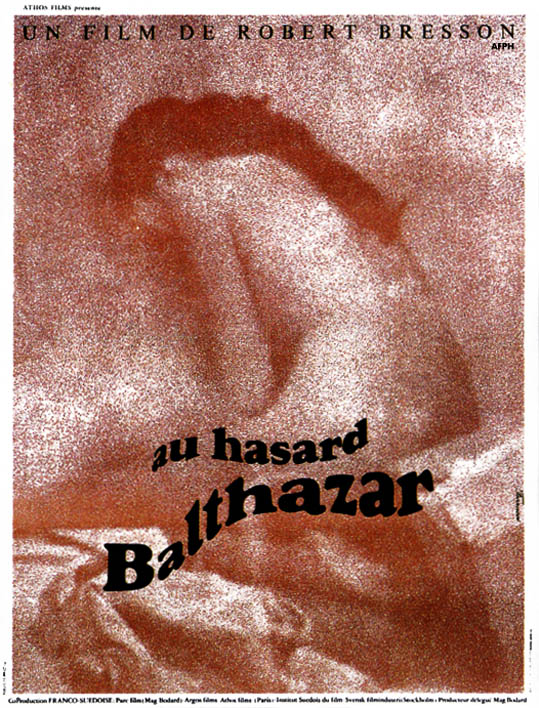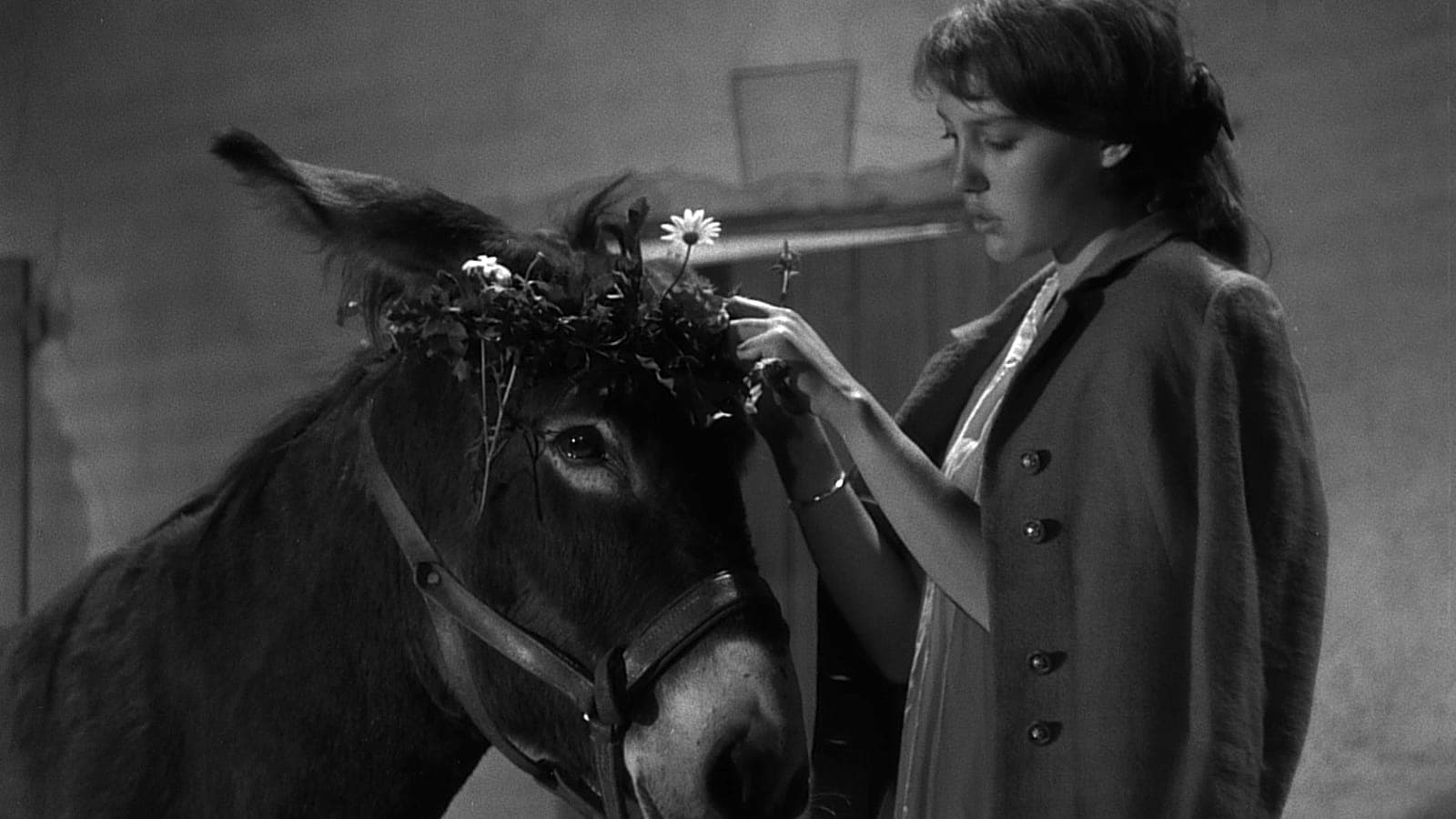
Christ, what an ass
"Le film, c'est le monde. Vraiment, en une heure et demi, en une heure quarante, voir le monde." -Jean-Luc GodardIn the opening moments of Robert Bresson's 1966 film Au hasard Balthazar* something remarkable happens that sets the tone for the entire piece: we see the credits, a simple affair of white letters over an indistinct grey background, listening to Franz Schubert's piano sonata no. 20, when the music slams to a halt, replaced by the agonized braying of a donkey in the throes of labor. For several seconds, the credits unassumingly roll along while we listen to the animal's screams. Then Schubert begins again, and the credits end, and we see the only truly blissful moment of the film: a donkey mother and child, at peace in a field.
["The film is the world. Truly, in an hour and a half, you see the world,"]
A book could be written on the use of sound in Balthazar, but it all begins with that jarring, shocking moment. To begin with the simplest possible reading (simple, but not therefore inappropriate or inaccurate), this is setting us up for the rest of the film, ninety minutes of the suffering of mankind at the hands of mankind. If Balthazar is the world in an hour and a half, then the credits are Balthazar in two minutes: a moment of beauty torn apart by pain.
Perhaps more importantly, this is the first moment of what is, for me at least, the most significant element of the film: the way in which, at all times, sound is used to refer to off-screen action. I wonder if this is closer to what Godard felt when he uttered his famous words - the film is not merely a metaphor for the world, it contains the whole world. Few films possess such a complete, omnipresent sense of the world outside the camera frame, but it is impossible to to ignore here. We hear planes flying overhead, there are unseen cars driving all around us, birds sing constantly. Virtually every shot in the film - 95% or more, anyway - is accompanied by a sound produced by an object or person not directly visible in the frame.
Bresson's radical blocking is part of this scheme, as well: not only does he use sound to expand the boundaries of the frame, he uses the frame itself to the same end. It is only rarely the case that a person or object is shot in the mere documentary style of a Hollywood film: "here is a person." Rather, we usually see just a part of them: here is someone's nose and chin, here is a portion of a door. Things spread chaotically beyond the edge of the image. Life cannot be contained.
Sound, image, and the third great component of cinema is the editing, and that is of a piece with its sisters, although in a much broader way. Read much about this film, and you'll quickly come across the world "elliptical" to describe the editing...well, why not? It is elliptical, in the dictionary sense of that word: there are events which are erased in a single cut, leaving their trace only in the fact that things have changed. An early example: two children beg their father to adopt a donkey. He refuses. After a dissolve, the children are walking with their new donkey. It is obvious that we missed a step: how did they change his mind? That the film acknowledges this moment occurred precisely by refusing to show it is certainly "elliptical," and part of the overall plan: make the audience unable to ignore the fact that things happen outside of the movie. There is a whole world we don't see, and only a tiny narrow fraction that we do.
Well and good, I suppose, to dwell on such things, especially in a film as challenging to decipher as this (if you think that I just gave some sort of Rosetta Stone for the editing, you obviously haven't seen the film), but this was supposed to be about Christ, or at least that's why I picked the unhappiest fictional film that I own as appropriate holiday fare. Christ is a donkey named Balthazar, after a fashion, and that fashion is influenced by Bresson's strong Catholicism: the innocent who suffers all manner of indignation and abuses, symbolically taking the burden of mankind's sins upon himself, and dying with the weight of those sins on his back.
The plot consists of two strands: in one, Balthazar is shuttled from owner to owner, always ending up a little bit worse off than before; in the other, his first owner Marie (Anne Wiazemsky), the only person who ever felt love for the donkey, is shuttled from domineering male to domineering male, always ending up a little bit worse off than before.
I am unfamiliar with the great majority of Bresson's cinema, and so I do not know how many of this story's themes recur in his work (though I am told that his film following this by one year, Mouchette, is a thematic sister film to Balthazar), and so I do not know if it's fair to call him a raving anti-modernist, but it's hard, and by "hard" I mean "impossible," to ignore the basic point that technology and the modern world are generally horrible things and they cause people to do horrible things to each other. That sense of a complete world beyond the camera that I was talking about before? It's used, practically, as a matter of bringing home to us how crushing and overwhelming the world is (not for nothing are most of those offstage sounds the sound of vehicles and tools). The two young men chasing after Marie's affections are Gerard (François Lafarge), an immoral young biker with a leather coat who steals things and comes thiiiiis close to raping the girl, and Jacques (Walter Green), a landowner's son who does not appear to own a bike or even a car (he is also a complete pill, but that's a side-effect of Bresson's unwillingness to create a sympathetic human figure).
This is the point at which most reviews turn into an explication of the meaning of some vignettes from the film, but I believe that these are all fairly obvious and you, my brilliant readers, are more than capable of figuring out simple plot things. But I must bring up the elephant in the room for any discussion of Au hasard Balthazar, the ending scene.
It's the received wisdom that this scene, in which Balthazar, laden with contraband and bleeding from an errant bullet, lays down and dies in a field of sheep with bells ringing, is transcendent. I imagine that this comes out of our knowledge that a practicing Catholic is unlikely to make a Christ allegory that doesn't end in transcendence, but I don't believe it's right. For one thing, it violates the spirit of the movie, which is unendingly bleak. The use of the Schubert piece in this scene is, admittedly, an indication that we should be looking for spiritual vindication; but given Bresson's later declaration that using Schubert in this film was "sentimental" and "a mistake," I think we can avoid putting too much weight on it.
Besides, there are good reasons to read against transcendence. The most pointed one is what happens at the moment of Balthazar's death: the sheep in the field all walk away from him, their backs literally turned. While this mirrors the rejection of Christ in the moment of his death, nothing about it is peaceful or glorious, or anything else that would imply transcendence. It is lonely and empty. I would also mention that the shepherds' bells we hear, often called an evocation of church bells, are thin and out of tune and clamorous, and in a film that has put so much effort into the specificity of its soundscape, I refuse to believe that crappy bells are meant to sound like church -anything.
Lastly, and I feel most importantly, the final shot of the film does not show Balthazar dead (this may not have been Bresson's desire, but it's the case anyway). We can clearly see the donkey breathing - the final moment of the film is not the peace of death, it is a moment of suffering. There is no transcendence in this. There is only agony.
Which is all in keeping with the film's forthright misanthropy. It has been 95 minutes of indignation and pain, and in the end a mute, non-human animal, the only thing in the film which has been good or loving, fails to achieve a moment with the divine. How could it? It's a donkey. This is the black punchline to the anti-joke that Bresson has been telling. In the absence of true human morality, we have allowed ourselves to think that we can find truth and beauty in Balthazar's story. But really, as the title has been telling us all along, we've just been watching some random ass.
*The title translates more or less into "By chance, Balthazar", but I prefer "Randomly Balthazar", as it suggests a sense of madcap lightness that film could not possibly possess to a smaller degree.






